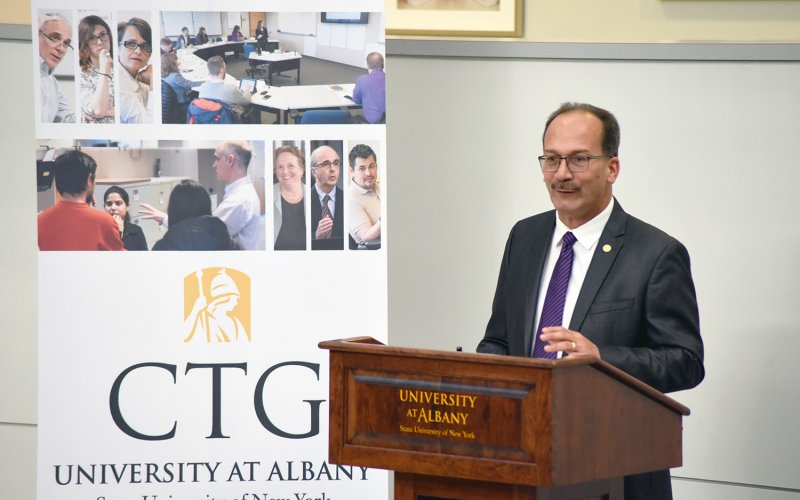CTG UAlbany Welcomes New Faculty Fellows

ALBANY, N.Y. (Sept. 8, 2022) — The University at Albany’s Center for Technology in Government (CTG UAlbany) has embarked on a new endeavor to build a strong and diverse university-wide community around the topic of information and technology in government.
“CTG UAlbany’s new faculty fellows program is designed to serve as a platform of intellectual exchange and an appreciation for interdisciplinary scholarship,” said CTG UAlbany Director J. Ramon Gil-Garcia, who is also a professor of Public Administration and Policy at Rockefeller College of Public Affairs and Policy.
CTG UAlbany, which works with governments worldwide transforming public services through innovations in technology, policy and management, has maintained a roster of research fellows since its founding nearly 30 years ago. The new program more than doubles the roster of experts in information, technology and government policy and will provide additional opportunities for colleagues from across the university to share knowledge and collaborate on topics related to information, technology, management and policy in the public sector.
“Our goal is to foster an environment to form collaborations, complete publications, develop new teaching initiatives to support students, and attract external funding,” said CTG UAlbany Research Director Mila Gascó-Hernandez, who also serves as an associate professor of Public Administration and Policy at Rockefeller College of Public Affairs and Policy. “We believe that with a small, but steady commitment, CTG UAlbany faculty fellows can benefit from networking opportunities and build synergies around the use of information and technology by government agencies, citizens, and other stakeholders working in the public sector.”
The roster of faculty fellows now includes:
- Temilayo Adeyeye, research assistant professor, Environmental Health Sciences, School of Public Health (SPH)
- Pradeep Atrey, associate professor, Computer Science, College of Engineering and Applied Sciences (CEAS)
- DeeDee Bennett Gayle, associate professor, Emergency Management and Homeland Security, College of Emergency Preparedness, Homeland Security and Cybersecurity (CEHC)
- George Berg, associate professor, Cybersecurity, CEHC
- Charalampos Chelmis, assistant professor, Computer Science, CEAS
- Gang Chen, associate professor, Public Administration & Policy, International Affairs, Rockefeller College
- Ming Ching-Chang, associate professor, Computer Science, Electrical and Computer Engineering, CEAS
- Hany Elgala, assistant professor, Electrical and Computer Engineering, CEAS
- Teresa Harrison, professor emerita, Communication, College of Arts and Sciences (CAS)
- Rey Koslowski, professor, Political Science, International Affairs, Rockefeller College
- Minyoung Ku, assistant professor, Public Management, John Jay College of Criminal Justice
- Hongseok Lee, assistant professor, Public Administration and Policy, Rockefeller College
- Brett Levy, associate professor, Educational Theory & Practice, School of Education
- Luis Felipe Luna-Reyes, professor and vice chair, Public Administration and Policy, International Affairs, Rockefeller College
- Jennifer Manganello, professor, Health Policy Management and Behavior, SPH
- Erika Martin, professor and PhD director, Public Administration and Policy, Rockefeller Colllege, professor, Health Policy Management and Behavior, School of Public Health
- Brian Nussbaum, assistant professor, Emergency Management and Homeland Security, CEHC
- Feng (Johnson) Qian, associate professor, Health Policy Management and Behavior, SPH
- Eliot Rich, associate professor, Information Systems and Business Analytics, School of Business
- Eric Stern, professor, Emergency Management and Homeland Security, CEHC
- Jeanette Sutton, associate professor, Emergency Management and Homeland Security, CEHC
- Giri Kumar Tayi, professor, Information Systems and Business Analytics, School of Business
- Masahiro Yamamoto, associate professor and chair, Communication, CAS
One of the University’s leading research institutes, CTG UAlbany was established in 1993 to pursue new ways to use technology to address practical problems of information management and service delivery in government.
CTG UAlbany collaborates with hundreds of domestic and international researchers on understanding and applying emerging technologies. CTG UAlbany also works with scores of local, state, federal, and international government bodies as a trusted advisor and facilitator of management and policy decisions to govern the use of new technologies as tools for public service transformation.




